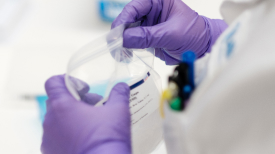- Cancer Care Team
Cancer Care Team
To deliver optimal patient outcomesProducts and Services
Cancer Type
Supplies & Tools
Scientific Focus
- Biopharma Partners
- Patients
- Education & Events
- Login
- Contact Us
Test Details
 Cancer Type
Cancer Type
Colorectal cancer (CRC), Endometrial, Hereditary cancer, Lynch syndrome
 Technology Used
Technology Used
Molecular
 Turnaround Time
Turnaround Time
6 - 10 days
Use
Hereditary colon cancers of the nonpolyposis type (HNPCC) or Lynch Syndrome (LS) is an inherited cancer syndrome caused by a germline mutation in one of several genes involved in DNA mismatch repair (MMR), including MLH1, MSH2, MSH6 and PMS2, or EPCAM gene. It is estimated to account for 1-3% of colorectal cancer (CRC). Although HNPCC is characterized by abnormal immunohistochemistry for MMR proteins and microsatellite instability (MSI-H), cancers exhibiting abnormal IHC for MLH1 and are MSI-H are most often sporadic (non-inherited) and due to abnormal methylation of the MLH1 gene promoter. Tumors that have the BRAF V600E mutation and MLH1 promoter hypermethylation are almost certainly sporadic, whereas tumors that show neither are most often caused by an inherited mutation. Testing for methylation of the MLH1 promoter can help distinguish sporadic from inherited cancers.
Special Instructions
Please provide a copy of the pathology report. MLH1 testing will be delayed if the pathology report is not received. Please direct any questions regarding this test to customer service at 800-345-4363.
Limitations
In vitro studies indicate that this assay has a sensitivity to detect approximately 1-5% methylated MLH1 promoter.
This test was developed, and its performance characteristics determined, by LabCorp. It has not been cleared or approved by the US Food and Drug Administration (FDA).
Methodology
Bisulfite converstion, methylation-specific PCR, and gel electrophoresis
Specimen Requirements
Information on collection, storage, and volume
Specimen
Formalin-fixed, paraffin-embedded (FFPE) tissue block or slides
Volume
8 pre-cut unstained slides at 5 micron with 1 matching H&E reference slide, or FFPE tissue block
Minimum Volume
Tumor surface area ≥4mm2 tumor area and ≥ 50% tumor content are preferred.
Container
Tissue block and slide container
Storage Instructions
Room temperature
Causes for Rejection
No tumor tissue in FFPE blocks or slides; broken or stained slides
Related Tests
Find more tests related to this one.





